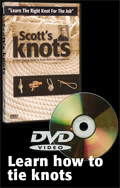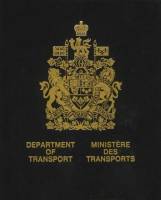Master Limited - 60 ton
Candidates for the Master Limited - 60 ton (with passengers) should find the following information invaluable as they work through the syllabus from Transport Canada. Having recently completed the 60 ton certification myself - I thought I would do my best to summarize the process, identify information sources, and give a better idea of what to expect that I was able to find at the time I was studying for my exams.Without this information, the process can be a bit confusing at points - there is a lot of conflicting information out there - especially from the Trasnsport Canada documents - which assume you already understand the entire process. Even now after Iīm finished the whole thing - I see bits that donīt make any sense to me.
I have provided a step by step process for how to complete this at the bottom of this document - there are probably other ways to get through it - and everything depends on your esperience and what certifications you may already have - but it should help regardless.
I hope this information is useful, but please be sure to confirm everything you find here with sources at Transport Canada ("donīt even trust the web site" - one of the examiners told me not to) go to the office, physically, and get the syllabus - it changes frequently - though not significantly
Requirements
You will need all of the following to achieve the 60ton certification:- 60 days (8 hours) of sea time (commercial)
- Standard First Aid Marine Advanced
- ROC-MC (VHF Radio license - Marine Commercial)
- MED A1/A2 (get A2 for passengers - basically the same course anyway)
- Transport Canada Medical
- Pass 040 Chartwork Exam
- Pass 061 Navigation Safety (ColRegs + Buoys)
- Pass Oral Exam
All of the exams you can study for on your own (this is what I did) - but you will need to take a course for the ROC-MC and the MED A2 as well as the First Aid.
Instead, if you wish, you can take a single course that covers everything here - it costs a lot more - but you can get it all done in one fell swoop. This document is not going to be necessary for people taking that path - itīs mainly for those wishing to work through it on their own and save a couple thousand dollars in the process.
Sea Time
For many, this is the hardest thing to get - it must be 60 days (8 hours each) performing deck duties - which means being the cook doesnīt count - you must be on the bridge as part of the watch. The sea time must be on a commercially registered vessel (needs to be in their database) The Master must sign off the time (they will call to check) The sea time must also be on a vessel of similar tonnage - so a lot of sea time on a 6 ton boat - even if itīs a commercial water taxi - may not cut it for the 60 ton certificate.I was lucky - I had 150 days sea time from SALTS vessels (~ 80 tons) so it was no problem - but for many this is a tricky one.
Marine Advanced First Aid
Not too much to say about this - go to My Wifeīs company BC First Aid (shameless plug) or a local: Red Cross, St. Johns Ambulance etc... and take the course. The only note is to make sure itīs the one currently required by TC Marine some of the documentation from Transport Canada makes it look like other courses will suffice - so double check this before you take it.Whatīs the difference from a normal first aid course? When I took it, just a small booklet that you need to read in addition to the course - thatīs it, there wasnīt even an extra part on the exam.
ROC-MC
Restriced Operators Certificate - Marine Commercial This is the required marine radio license for the 60 ton certification. Again, you will have to take the course. Unlike the basic ROC-M (the non-commercial version) which you can self-study and challenge the exam. This one includes time using simulators and covers more of the GMDSS system. Covering things like INMARSAT NAVTEX and various SOLAS devices .It is a 2 day course and was the most expensive part of the entire 60 ton process for me. It was also the most interesting as it covered many things I have never seen before. Plus the license comes as a very official looking little book, not some rinky-dink plastic card like the ROC-M
MED A1/A2
Marine Emergency Duties A1/A2 This is another course you must take - but again, its well worth it. The most important note here is the A1/A2 distinction. They are virtually the same thing! The only difference is that A2 includes about 15 mins about passenger crowd control (and a really bad old BC Ferries video if youīre lucky) that you must have if you ever want to carry passengers on your vessel. They cost the same, and they or the same duration.So, in short - Make Sure You Take A2
That said, most TC certified schools now offer the course as MED A1/A2 and donīt even offer the A1. Even my certificate lists it as A1/A2 (which technically doesnīt exist)
Its a pretty cool course though: You get to try on survival suits, inflate a life raft in a pool, shoot off some fire extinguishers etc... but again - this was the second most expensive part of the whole process.
Transport Canada Medical
Unless you have some health issues - this is the easiest part (although the third most expensive - it figures!) Just find a TC certified doctor and get a medical - they will know what you need if you ask for a īTransport Canada Marine Medicalī it will probably cost about $125040 Chartwork
You can choose to take a course for this - but if you know your stuff, itīs not necessary. The exam is 1.5 hours and consists partly of written answers but mainly chartwork marked off the chart directly. Bring a pen, 2B pencils (you loose marks if you donīt use soft pencil on the chart) non-programmable calculator, good eraser, dividers, and 18" parrallel rules (they asked a question on my exam that you needed 18" rules to answer without great difficulty)Chartwork Study Notes Section - Coming Soon.
My thoughts about the 040 exam
061 Navigation Safety (ColRegs)
Again, you can choose to take a course for this - but this is all about memorization - so its all about self study either way. The exam is a 100 question multiple choice exam that you have 1.5 hours to complete. All you need for this exam is a pen and a pencil.- Navigation Safety exam study notes - coming soon
- ColRegs
- Navigation Lights
- Code of Recommended Navigation Practises and Procedures
My thoughts about the 061 exam
Oral Exam
Once you get to this point you have done it all - all you need to do now is do it all again.My thoughts about the oral exam
The Process
Where do you start - here is how I would recommend that you tackle things. Discounting the time to collect enough sea time - this whole process took me about 6 months - it could probably be done faster but I was doing it īon-the-sideī:First Get your sea time. All crew require at least MED A1 within 6 months of starting work at sea anyway, so you can start with that and the ROC-MC while youīre getting your sea time. log all your sea time (or use a discharge book) and ensure you get the master to sign it off using the Transport Canada Sea Time Form they wonīt accept sea time any other way.
Second Once you have enough sea time get your medical done and visit your local Transport Canada office for the first time (youīre going to get to know that place well...) When you go to the office bring your passport (or some other proof of Canadian Citizenship) and your birth certificate - they wonīt even start a file for you without these. Bring all your sea time and fill out the form that summarizes it while you are at the office. You will also need to fill out an application form to be examined - this gets the process started and they will verify that you have the right amount of sea time for the certificate you want. If you have your ROC-MC and MED A2 bring those certificates too - they will photocopy everything and keep the sea time (they start a file on you and retain everything you give them)
Third Wait. One of the TC examiners will review your sea time and they will mail you a letter letting you know if you have been approved to be examined. Once you get that approval you can call the office to schedule your 040 and 061 exams (they cost about $25 each)
Fourth Take the written exams and wait for your marks. Assuming you pass both of these - schedule the Oral Exam (and pay the $25 again)
Fifth Take the oral and youīre done. They will even give you the formal certificate right then and there if you pass.



